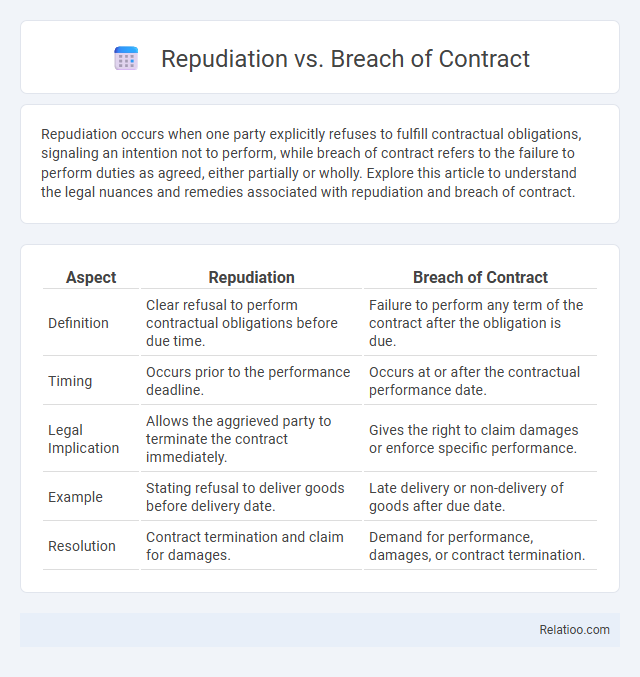Repudiation occurs when one party explicitly refuses to fulfill contractual obligations, signaling an intention not to perform, while breach of contract refers to the failure to perform duties as agreed, either partially or wholly. Explore this article to understand the legal nuances and remedies associated with repudiation and breach of contract.
Table of Comparison
| Aspect | Repudiation | Breach of Contract |
|---|---|---|
| Definition | Clear refusal to perform contractual obligations before due time. | Failure to perform any term of the contract after the obligation is due. |
| Timing | Occurs prior to the performance deadline. | Occurs at or after the contractual performance date. |
| Legal Implication | Allows the aggrieved party to terminate the contract immediately. | Gives the right to claim damages or enforce specific performance. |
| Example | Stating refusal to deliver goods before delivery date. | Late delivery or non-delivery of goods after due date. |
| Resolution | Contract termination and claim for damages. | Demand for performance, damages, or contract termination. |
Introduction to Repudiation and Breach of Contract
Repudiation occurs when one party clearly indicates an unwillingness or inability to perform their contractual obligations, effectively rejecting the contract. Breach of contract involves the failure to fulfill terms as agreed, which can be either partial or complete, causing harm or loss to the other party. Understanding repudiation is essential as it serves as a fundamental ground for alleging breach and seeking legal remedies.
Defining Repudiation in Contract Law
Repudiation in contract law occurs when one party clearly indicates an intention not to fulfill their contractual obligations, either through explicit statements or actions inconsistent with the contract terms. Breach of contract involves failing to perform as agreed, but repudiation specifically concerns demonstrating an unwillingness or inability to perform before the performance is due. Understanding repudiation helps you determine your legal rights to terminate the contract or seek damages immediately upon the other party's refusal to perform.
Understanding Breach of Contract
Breach of contract occurs when one party fails to fulfill their obligations as specified in a legally binding agreement, resulting in potential damages or remedies for the non-breaching party. Repudiation differs as it involves a clear indication by one party that they will not perform their contractual duties, either through explicit communication or actions. Understanding breach of contract is crucial for enforcing rights and seeking compensation under contract law frameworks such as the Uniform Commercial Code (UCC) or common law principles.
Key Differences Between Repudiation and Breach
Repudiation occurs when one party clearly indicates an intention not to perform their contractual obligations, while a breach of contract involves the actual failure to fulfill those obligations. The key difference lies in timing: repudiation is anticipatory and signals refusal before performance is due, whereas breach happens when the obligation is not met as agreed. Understanding these distinctions helps you decide whether to accept repudiation as a contract termination or pursue remedies for an existing breach.
Legal Consequences of Repudiation
Repudiation occurs when one party clearly indicates an intention not to perform contractual obligations, allowing the non-breaching party to terminate the contract and seek damages. Breach of contract involves the failure to fulfill contractual duties without the outright refusal to perform, typically leading to claims for damages but not immediate termination rights. Understanding the legal consequences of repudiation helps you protect your interests by enabling early contract termination and pursuing remedies more effectively.
Remedies for Breach of Contract
Remedies for breach of contract primarily include damages, specific performance, and rescission, offering you financial compensation or enforcement of the agreed terms when one party fails to fulfill their obligations. Repudiation occurs when a party clearly indicates they will not perform their contractual duties, allowing the innocent party to treat the contract as terminated and seek damages immediately. Distinguishing repudiation from a mere breach of contract is crucial for determining the appropriate remedy and timing for legal action.
Examples of Repudiation vs Breach Cases
Repudiation occurs when one party clearly indicates they will not fulfill their contractual obligations, such as a supplier notifying they will not deliver goods on the agreed date. Breach of contract involves the failure to perform any term of the contract without lawful excuse, like delivering defective products after committing to quality standards. Your understanding of these distinctions helps in identifying legal remedies and enforcing contract rights effectively.
How Courts Assess Repudiation and Breach
Courts assess repudiation by evaluating whether one party has demonstrated an unequivocal intention not to perform their contractual obligations, effectively breaching the contract before performance is due. In breach of contract cases, the focus is on the actual failure to fulfill contractual duties as outlined, examining evidence of non-performance or defective performance. Your understanding of these distinctions helps in discerning the legal consequences and remedies available when addressing contract disputes.
Preventing Repudiation and Contract Breaches
Preventing repudiation and contract breaches requires clear, well-drafted agreements with explicit terms and obligations, minimizing ambiguity that can lead to misunderstandings or disputes. Implementing proactive communication channels and regular performance monitoring helps identify potential issues early, allowing for timely resolutions before escalation. Employing dispute resolution clauses and legal remedies such as liquidated damages or specific performance serves as both a deterrent and mechanism to address repudiation and breaches effectively.
Conclusion: Choosing the Right Legal Response
Choosing the right legal response between repudiation and breach of contract hinges on the nature of the breach and its impact on the contractual obligations. Your decision should consider whether the repudiation amounts to a fundamental breach justifying termination or if a breach of contract allows for specific remedies like damages or performance enforcement. Careful evaluation of contractual terms and the severity of the violation ensures an effective strategy to protect your legal rights and business interests.

Infographic: Repudiation vs Breach of Contract
 relatioo.com
relatioo.com